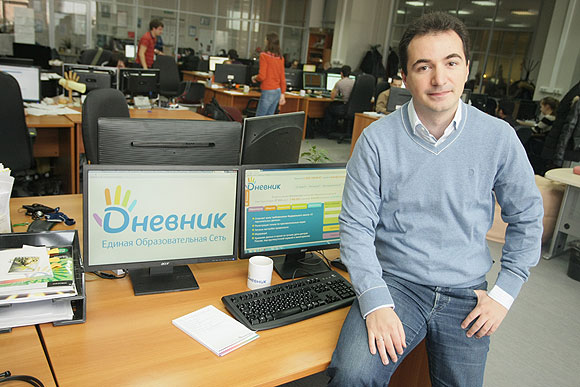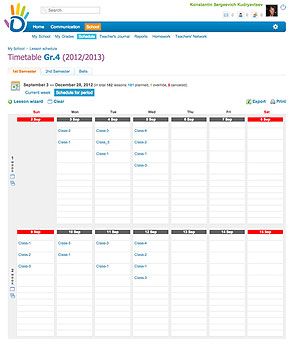REDMOND, Wash. — March 7, 2013 — During a trip to his home town in St. Petersburg, Russia, Gabriel Levi noticed that his local school system could modernize its services for educators and students by streamlining communication and reducing manual tasks. Using his entrepreneurial instincts, he saw a need and created a solution. Now Levi is CEO and founder of Classed In, where he has turned his mission into a thriving business with a comprehensive educational social network that connects teachers, students, administrators and parents at approximately 27,000 K–12 schools in Russia — more than half the country’s schools.

Levi attended college at Columbia University in New York and studied economics and computer science, while he dreamed of starting a business. When a work assignment took him back to St. Petersburg a few years later, he was struck by how Russian schools were still relying on completely manual processes for everything from registration and grade reporting to class assignments and homework. His point of reference was personal: Levi’s mother was a university instructor, and his younger brother was in middle school at the time.
“The main difference I noticed in the U.S. approach to education was that so much happened online: signing up for classes, communicating with instructors, reading lecture materials and so on,” he says. “As a student, it made it easier to choose classes, do research on teachers and teaching styles, and receive grades — and I could imagine the time savings for instructors. I thought that something like this should be in every school and university, everywhere.”
In contrast, Russian educational processes remained mostly unchanged from over 50 years ago. Strict bureaucratic requirements meant that teachers had to send grades and reports home with students daily as well as regularly submit test scores and reports to Ministry of Education officials, including school districts, regional ministries and the federal ministry — over 80 reports in all.
“I saw that by fixing a problem affecting my own family, I could also help address an issue apparent to every other family in the country,” Levi says.
All-In-One Solution Connects Classrooms
Levi’s solution, known as Dnevnik.ru in Russia and renamed Classed In for the North American market, is a cloud-based software platform that automates administrative processes, while also providing online learning capabilities and a private social network with security features for each school or school district.
Employees at Classed In focus on three areas where schools need the most assistance:
- Efficiency. By automating administrative processes, including grading, homework, reporting (to principals, administrators, regional education officials, etc.) and admissions, Classed In works to increase efficiency. According to Levi, the automation function alone saves teachers up to 30 percent of the time they used to spend reporting, preparing for lessons, doing research and managing grades.
- Collaboration. Classed In works to improve communications for the school community, including personal messages, blogs, email and documents. This helps connect teachers, students, parents and administrators in an open and transparent way that is designed to be completely private. Classed In has the same functionality as a social network but is a closed system. Teachers can confer with one another to prepare better for classes, and they can engage more with students than in the typical classroom teacher-student interaction.
- Access. Classed In provides e-learning capabilities such as webconferencing, streaming lectures, media libraries and online testing. A school can provide online courses for a particular student or for a whole class, so learning can continue when schools are closed due to bad weather or when students stay home when they are sick.
Classed In Scales Education Services With Cloud Technology

“Running an entirely cloud-based solution serving millions of users presents some interesting technical challenges,” Levi says. “We knew that scalability would be a major priority for our customers.”
Offering administrative resources, private social networks and online learning tools, Classed In uses Microsoft software to help schools create modern classrooms. In addition to using ASP.NET and Microsoft SQL Server, the company uses Windows Azure, Microsoft’s cloud computing platform. “Windows Azure lets us store essentially unlimited amounts of video, photos and other content in the cloud and to back up our enormous files,” Levi says.
In addition, Classed In uses the Microsoft Live@edu suite of hosted services and applications for its email service. “We are now one of the biggest providers of Live@edu email in the world, but we started out small,” he says. “Even when we had fewer than 100 schools signed on, Microsoft was willing to work with us, and that vote of confidence meant a lot.”
That encouragement was repeated when Classed In was accepted into the Microsoft BizSpark program, which has helped provide the company with software licenses, technical support, connections to investors and go-to-market strategies.
“It’s very important that major corporations with budgets and influence help startups get off the ground,” says Levi. “And it’s smart for the corporations, too, because they’re helping create a broader ecosystem.”
Classed In Looks to Help Schools at a Global Scale
Classed In has expanded from only a few employees, its founder and three programmers to a staff of 120 employees, including 70 technical professionals. Within its initial market of Russia, Classed In is adding about 1,000 new schools a month and plans to expand both geographically to more countries worldwide and in the range of services it offers.
Classed In is thinking big with global plans, but the company is expanding carefully to ensure it retains top-notch customer satisfaction.
“The problem we’re solving is universal; improving educational processes is important in any country and any school,” says Levi. “We’ve found that about 90 percent of the time educational problems aren’t hard-coded in the system and can be fixed with the right information and technologies.”




